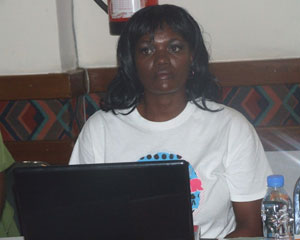
HIV and Aids activists have expressed concern over the delay by the judges to announce judgement in the case of Douglas Muzanenhamo, a rights activist living with HIV, and are now mulling a protest march to force the judiciary to act with urgency.
BY PHYLLIS MBANJE
Muzanenhamo filed a constitutional application at the Supreme Court in September 2012 challenging the ill-treatment of people living with HIV in detention by police and prison officials. He sought an order compelling police and prison officials to respect the rights to access medication of detainees living positively with HIV and Aids.
In the application, he said every prisoner who is HIV-positive should be given an opportunity to access anti-retroviral (ARV) drugs, as prescribed by medical practitioners while in custody.
His case was finally heard before the nine judges: Godfrey Chidyausiku, Luke Malaba, Paddington Garwe, Bharat Patel, Vernanda Ziyambi, Anne-Marie Gowora, Ben Hlatshwayo, George Chiweshe and Antonia Guvava.
The judges however, reserved judgement, a move which has irked the activists who are now calling for collective action in solidarity with Muzanenhamo.
The activists, drawn from several organisations which include Women’s Health, HIV and Aids Southern Africa headed by Tendai Westerhoff and ZNNP+, are mulling a protest march to press the judges to make the announcement and also highlight the case which they feel is not peculiar to Muzanenhamo but to many other people who would have gone through the same treatment but were never heard.
The activists said they were prepared to go to the streets in solidarity with Muzanenhamo, whose landmark legal application could change the fortunes of people living with HIV and Aids.
- Chamisa under fire over US$120K donation
- Mavhunga puts DeMbare into Chibuku quarterfinals
- Pension funds bet on Cabora Bassa oilfields
- Councils defy govt fire tender directive
Keep Reading
The activists said that it would not be a political demonstration but a “social change movement’.
Regional Director of The Aids and Arts Foundation (Taaf) Emmanuel Gasa said they were not happy with the way the police handled Muzanenhamo during his incarceration. They also said the whole issue should not have been politicised.
“The State has a case to answer and it was clear during the court process that the police’s story had gaps.”
He said the protest was a way of ensuring that the case received the attention it deserved in record time.
“It is a matter of life and death, period. People should be held accountable for their actions.”
The activists were now waiting for the ZNNP+ to coordinate the protest.
In his application, Muzanenhamo, who has lived with the condition for the past 18 years, said he was denied access to his life-prolonging ARV drugs in contravention of Section 12 (1) of the Constitution.
Muzanenhamo was part of a group of 44, including Socialist Organisation leader Munyaradzi Gwisai, who were arrested for allegedly plotting “Egyptian style” tactics to topple President Robert Mugabe from power.
Although the case was later thrown out, the activists had already suffered much while in detention.
His lawyer Tawanda Zhuwarara of the Zimbabwe Lawyers for Human Rights said his client was deliberately denied medical attention and access to his cellphone which he intended to use to make arrangements for his family to bring him his medication.
In a statement Zhuwarara said while in prison, Muzanenhamo was placed in solitary confinement for complaining that they were not treating him well.
He was also forced to strip naked in police cells; a move which the activists are saying could have exposed him to infections like pneumonia.
In his application, Muzanenhamo cited the police officer-in-charge for the Law and Order section in Harare, Commissioner-General of police Augustine Chihuri, Home Affairs co-ministers Theresa Makone and Kembo Mohadi, Justice minister Patrick Chinamasa and Attorney-General Johannes Tomana as respondents together with the officer-in-charge of Harare Central Prison, where he was detained.
The State however, represented by Tinei Dodo from the Attorney-General’s office, shrugged off Muzanenhamo’s application claiming that the police officers were not aware of his condition.
The police also disputed several points in the application; grounds which the State said warranted dismissal of the application.











